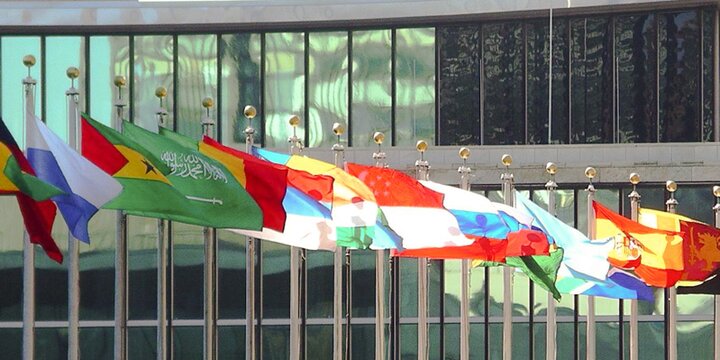Students! Please remember when consulting the course idea list the following:
- Students must work with advisors to determine whether courses on this list will work with the student’s Minor Plan of Study.
- Courses should be considered as OPTIONS for students to consider with an advisor. Each student must be able to articulate why the courses they have selected will fit into his/her thematic area or area studies.
- All substitutions to your Minor Plan of Study must be approved by an advisor.
Global Studies majors develop the interdisciplinary knowledge and intercultural skills necessary to analyze and solve contemporary world problems. In consultation with an advisor, students select courses from a variety of departments to form a coherent program of study suited to individual interests, educational and career aspirations. The Global Studies minor can complement any major.
A total of 21 hours, with a minimum of 6 advanced hours, is required for the Global Studies minor. Minors are strongly encouraged to take GLBL 100 prior to pursuing the minor to gain an understanding of the field.
Interdisciplinary Foundations (9 credits)
Foundations courses introduce students to various social science disciplines and interdisciplinary analyses, enabling students to:
- describe and critique the contemporary international system;
- analyze the environmental, political, economic, and social conditions of different world regions; and
- research and debate world events, global processes, and cross-cultural perspectives.
Social Science Core Courses (9 credits): These courses offer students a firm grounding in the social science disciplines of Anthropology, Economics, Geography, History, Political Science, and Sociology, so that students can draw from these disciplinary perspectives in analyzing global issues. Global Studies minors must select a total of three courses from the list below, with no more than one course in each discipline. See our current recommended course list for this semester's offerings
Anthropology
- ANTH 230 Sociocultural Anthropology
- ANTH 260 World Ethnography
- ANTH 268 Images of the Other
- ANTH 270/271 Language in Culture
Economics
- ECON 202 Economic Statistics I
Note: this course has a prerequisite of credit or concurrent registration in one of MATH 220, MATH 221, or MATH 234 - ECON 420 International Economics
- ECON 450 Development Economics
Geography
- GGIS 204 Cities of the World
- GGIS 210 Social & Env Issues
- GGIS 221 Geographies of Global Conflict
Global Studies
- GLBL 200 Foundations of Research
History
- HIST 258 20TH Century World to Mid-Century
- HIST 259 20TH Century World from Mid-Century
- HIST 274 US & World Since 1917
Linguistics
- LING 222 Language in Globalization
Political Science
- PS 241 Comp Politics in Developing Nations
- PS 280/281 Intro to International Relations
- PS 282 Governing Globalization
Sociology
- SOC 226 Political Sociology
- SOC 261 Gender in Transnational Perspective
- SOC 270 Population Issues
- SOC 350 Technology & Society
- SOC 364 Impacts of Globalization
- SOC 367 Globalization Dynamics Debates
Advanced Languages (3 credits)
Through advanced coursework and immersion in a foreign language and corresponding region of their choice, Global Studies minors develop the ability to communicate effectively in multilingual academic, professional, and social contexts.
Advanced Language Coursework (3 credits): Global Studies minors must complete 3 credit hours of advanced coursework in a language that is not their primary language. This requirement enables students to work in non-English speaking contexts and to gain familiarity with new ways of thinking, perceiving, and relating to other people.
Global Studies majors must select from the courses listed below to fulfill this requirement. All advanced language courses require four semesters of previous study at UIUC or the equivalent as determined by a placement exam. Students continuing a language that they began studying elsewhere should contact the corresponding language department to schedule a placement exam. The advanced language requirement for Global Studies minors cannot be waived through a proficiency exam. Global Studies minors may pursue languages that are not on this list by making arrangements with language instructors and consulting with a Global Studies advisor.
Click here to see Advanced Language Courses for Global Studies Minors.
Thematic Areas (9 credits)
The thematic area allows students to find their passion, something they want to pursue after graduation. The immediate goal of finishing coursework is thus taken over by the intention of truly enjoying the subject matter at hand. The ability to tailor the minor to their interests further enables students to become conscientious human beings, who are invariably successful in their endeavors. Thematic area courses enable students to:
- specialize in a global issue that aligns with their professional and personal aspirations;
- articulate a deep understanding of the thematic area by drawing upon multiple disciplinary perspectives; and
- apply the theoretical and practical knowledge gained in a professional context.
There are seven thematic areas in the LAS Global Studies minor and students have the freedom of choosing their unique topic within a thematic area. For example, a student interested in environmental justice may declare Environment, Sustainability and Social Responsibility as a thematic area, and environmental justice as their specific topic. The student may then, as an example, proceed to take courses in law and environmental studies to build their distinctive expertise; apart from any other Global Studies student.
Requirements: Each student must complete 9 credit hours of course work towards their thematic area, of which 6 credit hours must be advanced, i.e. at the 300 or 400 levels of classes. These advanced classes are intellectually challenging and aim to build students’ expertise on their topic of interest. The thematic area must have classes from more than one discipline. Students must consult a Global Studies advisor about their course selection to gain maximum benefit from their thematic area. The advisor will ask students to justify their courses vis-Ã -vis their professional aspirations to ensure that the skill set the student is developing will aid their growth in the long run.






